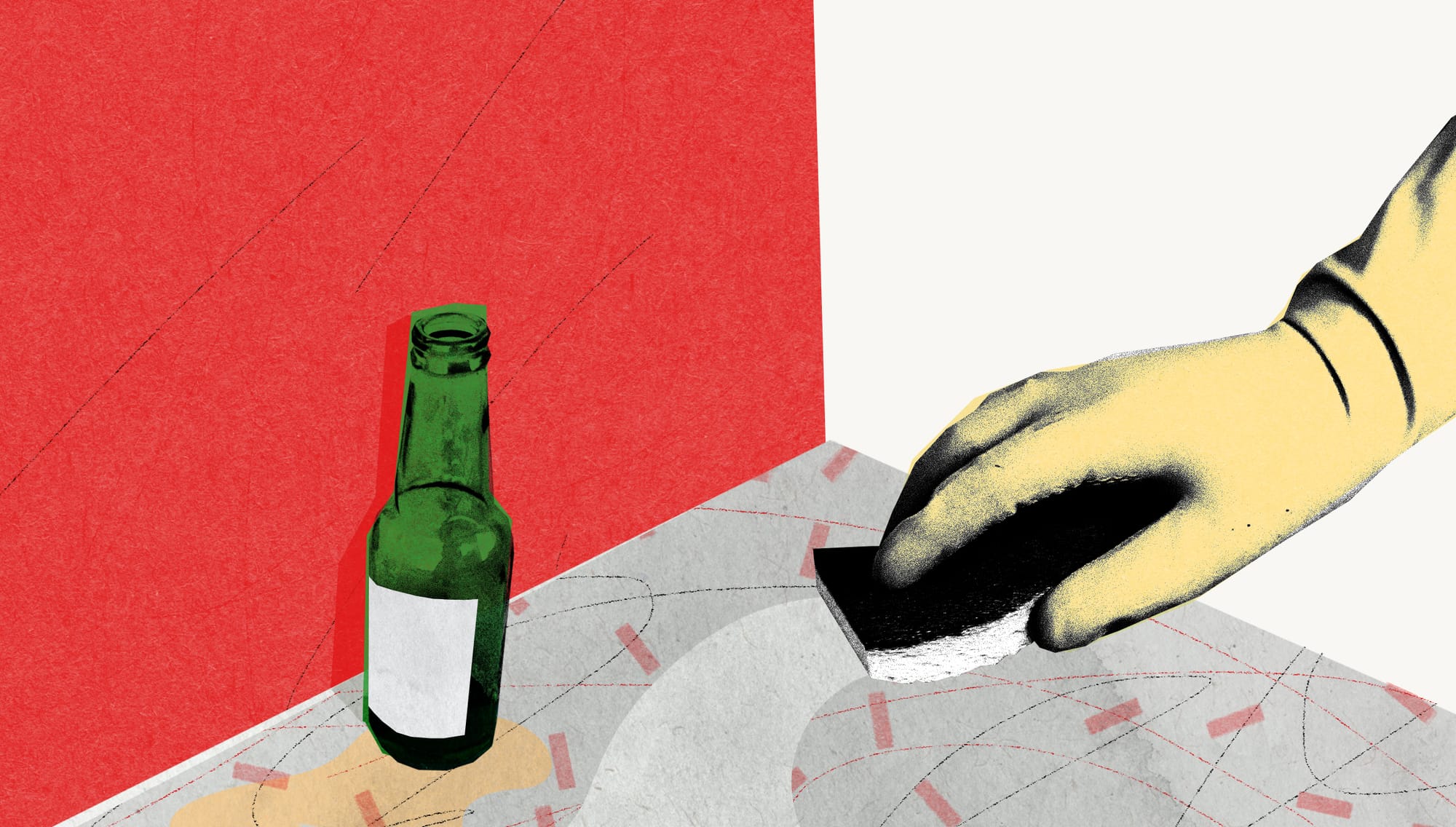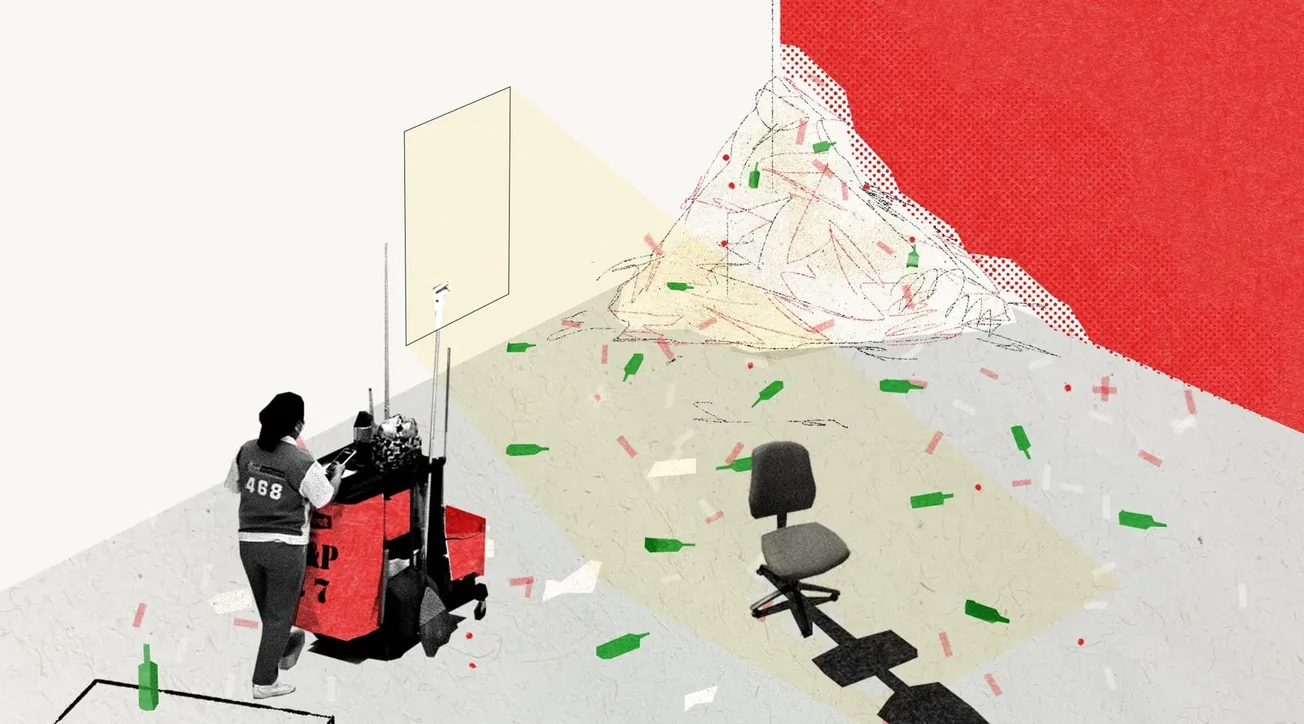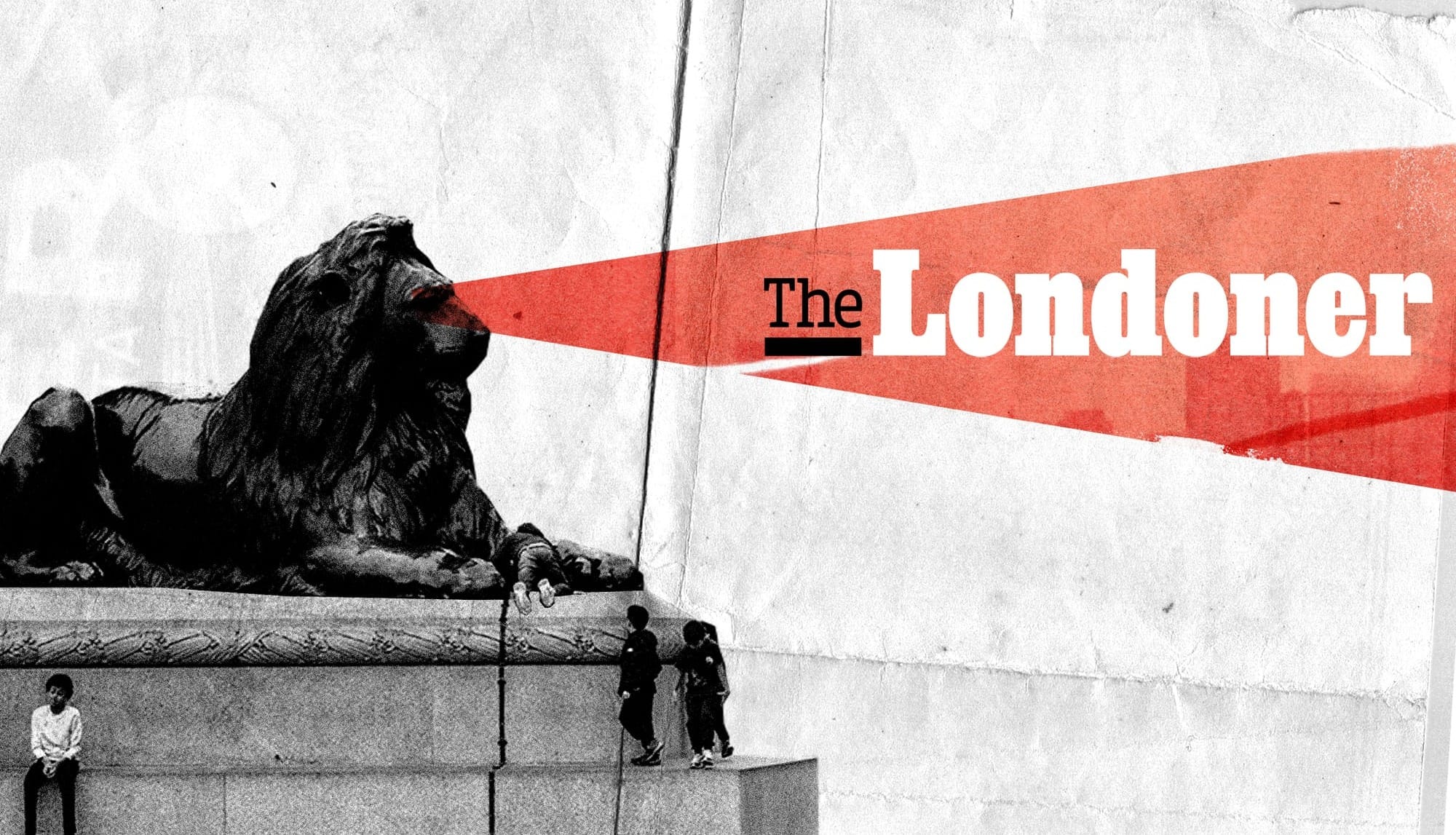In the first season of the hit BBC show Industry, which portrays the sex-and-drug-filled lives of young workers in the City, there’s a scene in which an army of cleaners restore order to the office after a debauched Christmas party. They clear up the champagne glasses, scrub semen-spattered mirrors in the bathroom and find banknotes that are still tightly rolled up and covered in powder. The camera lingers over one young woman in a ponytail, wearing the black polo-shirt of her cleaning agency, as she puts phones and Christmas decorations strewn over the trading floor back onto desks.
It’s not a subtle message, but it works. For a few seconds we glimpse a class of people who work in the City but who would never be described as City workers. And they would rarely be invited to office parties. The people who clean the most expensive offices in London have to get up before sunrise, get a long bus into town and clean up after workers who earn more in a financial quarter — or even a month — than they do in a year. How does that feel? And is it worse at this time of year, with office parties in full swing?
It took a while to find someone like Marianna — someone who has experienced the kind of cleaning job faced by the cleaning crew in Industry. Many of London’s cleaners do not speak very good English (we used an interpreter to speak to her) and have very little job security from their cleaning agencies and would be sacked if they were caught speaking to journalists (Marianna isn’t her real name and all the names in this piece are pseudonyms).
We meet her in Lewisham Shopping Center — she’s in her fifties and has a warm demeanour. She’s not confident with English but nevertheless inserts English phrases where she can. She came to the UK from Spain after the financial crash — not specifically to become a cleaner but to provide for her children, who’ve since joined her in London. When she started work in London’s offices, she was blown away by their grandeur. “But the reality is another thing,” she says. She always dreaded the Christmas party season, she tells us. December is the worst.
In her time in London, she’s been cheated out of pay by employers and suffered pains in her hands and legs from the work. She’s also clashed with her managers, who told her that she wouldn’t be paid extra for working weekends or cleaning human waste (she says she would typically earn around £10 per hour). But despite the drudgery of her daily work, she’s proud of how her kids have flourished. Her daughter works supporting domestic abuse cases and her son is a systems engineer.
Two years ago, she arrived at an office on Fenchurch Street and was faced with the grim aftermath of an office Christmas party. She and a crew of 50 cleaners got to work clearing up discarded bottles, unsorted rubbish and the rolled-up paper stained with what she assumed was semen. In the bathrooms, according to Marianna, revellers had attempted to be sick in the bowl but missed completely. She hoped her agency would provide her with a mask and she recalls the strong cleaning product she was using splashing towards her while she worked. Given the language barrier, it’s difficult for her to express exactly how she felt that morning, but she’s clearly unhappy about it. “[We] weren’t given enough protection,” she says.
How common is an experience like this? Many firms in the City have cut back on Christmas celebrations in recent years in order to save money and reduce the risk of expensive litigation resulting from alcohol-fuelled mishaps. And contrary to public perception, City workers these days are probably more likely to be introverted maths nerds than coked-up rugby boys. But the dynamic highlighted by Industry — between well-paid office workers and the people who clean up after them — is an awkward intersection where two London worlds meet, often without speaking.

Parties themselves were never the biggest problem for Camila (again, not her real name), but the season is still a reminder of how ignored she can feel in this job. At one of the central London offices she cleans every evening, she and her fellow cleaners were recently given pizzas as a thank you present for Christmas. “They were just labelled, 'cleaner one', 'cleaner two', 'cleaner three,'” she explains, through a translator — the company hadn’t bothered to add names. She says she feels “completely invisible” in her daily work. “Nobody really acknowledges my presence”.
Middle-aged with slightly curled hair, Camila goes to great lengths to stress that the work isn’t all bad. She emigrated from Sao Paulo almost two decades ago and cleaning work has allowed her to get financial independence from a controlling and abusive ex-husband. It’s not her dream job — she studied architecture back in Brazil. But it pays, and it's the kind of work she can do while still trying to become fully fluent in English. Plus, the “invisible” office block is one of two Camila cleans each day: at 4am she gets the night bus to a different high-end office where, she explains, she is treated like “any other staff member”.
But in the evening, as she tries to subtly weave her way around the last of the other office’s late-working staff picking up their dirty plates and glasses, it’s another story. She says she’s tasked with cleaning two whole floors alone in three hours, an impossible target, especially when the workers leave bottles, plates and food out after a gathering or meeting. Rushing to meet these kinds of expectations is “stressful”, Camila says. Last week, it got too much. She left the office on the brink of a panic attack unable to finish her shift.
John*, another cleaner of six years who works across several of the office blocks near Paddington, told us those kinds of unreachable expectations were commonplace. Last summer, he was expected to cover the extra work of two other cleaners who had gone on holiday without any extra pay or hours. That’s made worse by a rotating cast of managers at his agency who are often “abusive” to staff, especially when they try to complain. “All of us feel underappreciated,” he says. “We’re just like a number to them.”
“It makes me feel extremely uncomfortable,” says one thirtysomething worker at a well-known financial firm, who describes the “strange divide” between her colleagues and the office’s cleaners, who work for an agency. In her office, the cleaners come around with a trolley to pick up dirty plates and cutlery from desks, as if the workers are too busy — or too good — to take their plate to the kitchen and wash it. “People do just take the piss,” she says.
She recalls one cleaner she got to know who worked both a day job and a night job cleaning offices but who still couldn’t afford to get the Tube into work, so took the bus instead. “She was just constantly worried that she was going to lose her job because she was late,” she says, a reflection of the insecure employment most cleaners have. “She had an extremely fragile financial situation,” the financial worker says. “She was so stressed out about her work and her finances.” She recalls that one of her colleagues offered to tutor the cleaner’s son so that she had one less thing to worry about, an example of how the relationship between cleaners and workers isn’t always one of passing silently on the office floor.
According to public figures, London’s 24,000 full-time cleaners earn around £480 a week on average, and inevitably that means they usually have to live far out of town, taking long journeys to work in the morning. And according to Delia Cannings, chair of the British Cleaning Council, the feeling of underappreciation described by the cleaners we interviewed is common. “You become invisible when you're cleaning,” she says, describing how, in her previous cleaning jobs, she would don the uniform and suddenly vanish. “There are those that feel that they are above [cleaners], unfortunately, and can be a little bit disrespectful,” she says.
Many companies don’t employ cleaners directly anymore but via agencies, whose employment terms tend to be much worse than those enjoyed by regular members of staff. Cleaning workers, Cannings says, often don’t speak English, and are attracted to a job where “their language skills will go unnoticed”. This leaves them open to exploitation by a minority of “unscrupulous cowboys” — companies that might pay below minimum wage or not provide adequate PPE or training. One study by the Latin American Women’s Rights Service of marginalised Latin American workers in London, mostly cleaners, reported that a fifth had been paid less than the minimum wage and 41% had experienced “discrimination, harassment or unreasonable treatment”.

The report tells the stories of just some of the hundreds of the cleaners the service has helped in the last few years. One cleaner was refused the sick leave she needed to get medical care when they got cancer, instead being forced to seek alternative treatment from a doctor her employers knew. Another was forcefully held against a wall and sexually assaulted by an employee of the office block she was cleaning. When she tried to complain she was told that because the aggressor worked for the company that hires their cleaning company there was nothing they could do.
Cannings would like us to stop thinking of cleaning as an unskilled job, perhaps a first step to affording more respect and dignity to the people arriving at the office in the small hours. To her, cleaners are “hygiene technicians” who have to work in stressful conditions and use high-power cleaning agents and technical equipment. “They're having to manage time, techniques, tools, expectations, and deal with ignorant people,” she says.
Several cleaners we spoke to aspire to roles that receive more money, and more respect. Marianna wants to be a secretary one day and Camila would love to have a more creative role in line with her education and interests. They’re both painfully aware of the gap that exists between them and the people they clean for. In fact, they probably think about it more than the office workers even clock their presence in the corridor.

Comments
How to comment:
If you are already a member,
click here to sign in
and leave a comment.
If you aren't a member,
sign up here
to be able to leave a comment.
To add your photo, click here to create a profile on Gravatar.







